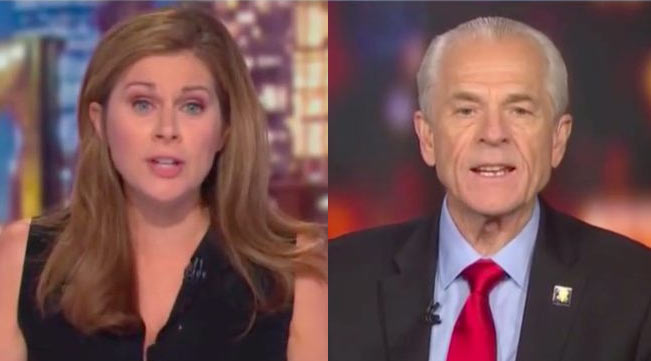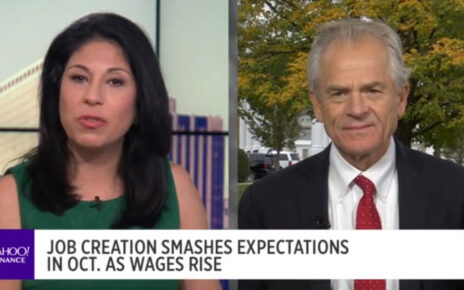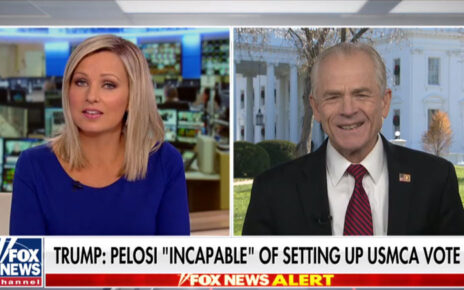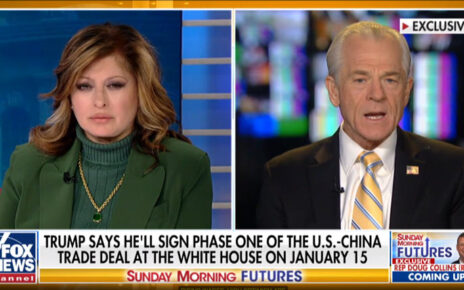August 2, 2019 – CNN, Erin Burnett
TRANSCRIPT
BURNETT: This after Trump said he will impose a 10 percent tariff on $300 billion worth of goods from China. The new tariffs would impact things like toys and iPhones and are set to go into place on September 1st and that tariff is in addition to the 25 percent levy already imposed on $250 billion of goods from China.
OUTFRONT now, Peter Navarro, Assistant to the President and Director of the Office of Trade and Manufacturing Policy.
Good to have you with me, Peter, as always. So look, the tariffs that the President talked about yesterday haven’t even gone into effect yet, now he’s threatened even more tariffs, “I can increase it substantially. I can increase it to a much higher number.” Do you think China believes him?
PETER NAVARRO, ASSISTANT TO THE PRESIDENT: Of course they believe him. Everything he said he’s going to do he’s done. On this issue of the tariffs themselves. What we’ve had so far is 25 percent tariffs on percent250 billion. And the remarkable thing in a way is that the Chinese have managed to basically devalue their currency by a full 10 percent and lower their prices.
So they borne virtually the entire burden of these tariffs. We’ve seen negligible to zero inflation on the tariffs. And if you think about putting 10 percent tariffs on these additional $300 billion of Chinese goods —
BURNETT: Which by the way our consumer products a lot of these.
NAVARRO: Correct.
BURNETT: This is toys and goods. These are things that people buy.
NAVARRO: Let’s think about this, Erin, and let’s do a little math here, a consumer math. When we started the tariffs back in March of 2018, since then the Chinese currency has fallen by 10 percent. So even if we were able to pass – if the Chinese could pass on the tariffs all to the consumers, we’d still only be back to where we were a little over a year ago.
[19:30:03] So, this whole idea that somehow these tariffs are going to create inflation, we’re just not seeing it. The Chinese are gaming the system.
Why did we do this? I think that’s the important question.
BURNETT: So, can I ask you a question, though?
NAVARRO: Sure.
BURNETT: I understand — and I understand it’s part of negotiation, but I just want to follow up on the point on pricing before you move on.
NAVARRO: Sure.
BURNETT: You’re talking about overall inflation. I get it. If you are — as you had put tariffs talking about 25 percent some components and not others, right? The impact on price would not be a full 25 percent.
One of the first things hit by tariffs, one of the very first when you all did this, as you said in the spring, was washing machines. A study conducted by two researchers at the University of Chicago and a Federal Reserve board governor found after the tariffs imposed, the ones that you did there, washing machine prices have gone up by $86.
La-Z-Boy says —
NAVARRO: So, this is apples and oranges —
(CROSSTALK)
BURNETT: Let me give one other number.
NAVARRO: Yes.
BURNETT: La-Z-Boy says it’s passed on tariffs to consumers, it says directly.
NAVARRO: But this apples and oranges, Erin. What you’re talking about —
BURNETT: OK, but they say $42 extra dollars for a $120 sofa. That’s really money for Americans.
(CROSSTALK)
NAVARRO: We’re talking — you shifted the argument. We’re talking — you and I are talking about tariffs on Chinese products. You’re talking about tariffs on steel and aluminum. If you want to have that conversation, we can have it but it’s a completely different conversation
BURNETT: Well, it’s tariffs you put on things from China. We can talk about the distinction between components or finished goods.
NAVARRO: No, no. The Steel and aluminum tariffs are a totally different issue. We put steel and aluminum tariffs on because we have to have steel and aluminum industries in this country. The president took a bold decision to do that. And those tariffs have been tremendously successful in reducing steel and aluminum.
BURNETT: Right, I understand what you’re saying, but I’m saying that washing machine prices have gone up by $86. So, Americans —
NAVARRO: And your point is that, is what? That that so we have steel mills blocked –
(CROSSTALK)
BURNETT: The policies you have put in place are costing regular Americans money.
NAVARRO: So, hang on, hang on, Erin. We have steel mills blossoming in Toledo, Ohio, Marion, Ohio, Cuyahoga Heights, the Mesabi Iron Range in the state of Minnesota is just humming. I was down in Duluth personally watching iron ore pellets put on ships that were going across the Great Lakes to steel mills.
BURNETT: Uh-huh.
NAVARRO: Granite City — I mean, look, the steel and aluminum tariffs were a necessary action to defend our steel and aluminum industries from predation around the world, dumping, and those tariffs have been enormously successful inducing investment.
BURNETT: So, you think that’s what — OK, that’s your case. I get it.
NAVARRO: But I think it’s better to have a conversation here about China because that’s what the news is. And I think it’s important for your viewers to understand why President Trump is showing leadership on this, and why Senator Chuck Schumer came in right behind him and supported exactly what he is doing.
BURNETT: So, tell me why with the latest tariffs — I understand you are making the case you think it’s worth it on steel and aluminum, that people paying more. What about toys? What about shoes? What about iPhones? What about $42 more on a La-Z-Boy, on those? Why —
(CROSSTALK)
NAVARRO: Are you talking about China tariffs? I’m telling you, Erin, flat out, that you will not see significant consumer price hikes from a 10 percent tariff on these remaining $300 billion. The Chinese basically are handling this by lowering their prices and lowering their currency. And if you look at the first $250 billion where we had 25 percent tariffs —
BURNETT: Yes.
NAVARRO: — we have seen zero inflation.
So don’t get out the violin and start playing about how consumers are some kind —
BURNETT: Right, on that 25 percent —
(CROSSTALK)
NAVARRO: Hang on, how consumers are somehow bear some burden when in fact a year ago —
(CROSSTALK)
BURNETT: Hold on, hold on, because I understand I know it’s confusing to everybody. Twenty-five percent impacted La-Z-Boy, they say they put a discharge on specifically because of that tariff. They say that. I’m not estimating, that’s what they say, right? They say 3 to 4 percent.
NAVARRO: So, show me in the data where there is inflation, Erin. BURNETT: I know, but you’re citing overall inflation. I would too if
I were you.
(CROSSTALK)
NAVARRO: I don’t even why you’re beating this dead horse. I’ve asked and answered your question.
BURNETT: But I’m saying I’m an American — hold on, Peter, let me just finish the point, please? An American goes to a store —
NAVARRO: I think the American question is why we were taking this action? Can we talk about that? China you know that — you agree with me on this.
BURNETT: You’re taking the action if they’re violating trade policies, they’re hurting the United States and it’s going to be better for consumers. I’m asking you to make the case of why Americans consumers should be paying more for things to accomplish that.
NAVARRO: I can’t answer this more clearly. China devalued its currency by 10 percent over the last year —
BURNETT: Yes, but La-Z-Boy is saying it’s $42 more for a $120 sofa. So, that’s what $42 more.
NAVARRO: — and if we add 10 percent with $300 billion — well, if you keep talking over me, you’re not going to be able to hear what I say. So, if we can take turns on this —
BURNETT: You keep telling me that they devalued the currency so it’s not zero. And I’m telling you it’s not zero. So, we’re kind of talking past each other.
(CROSSTALK)
NAVARRO: Look, I’m telling you that if we raise tariffs on 10 percent — by 10 percent on $300 billion and China already devalued the currency by 10 percent over the last year, how can you get out your crocodile tears for consumer effects?
BURNETT: Well, then, they have to do another 10 percent.
NAVARRO: It’s just not happening.
That’s the problem here. Nobody except the retail federation can point to anything. And they’re making stuff up.
[19:35:02] It’s just — look here is what’s going on here. The reason why the president raised these tariffs is for three reasons. One is that the Chinese are not fulfilling their commitments to buy any farm products.
BURNETT: Yes. NAVARRO: Two, they are killing people — before this night ends, 100 more Americans are going to die from made in China fentanyl and opioids. By the end of this week, over 1,000 Americans are going to die from made in China fentanyl and opioids, and over the year, it’s going to be 50,000 people. And they’re accountants, they’re doctors, they’re war veterans who dodged shrapnel and bullets in places like Afghanistan and they come and die because of a speck of fentanyl dust the China makes.
And so, the president is standing up to China. He has the backing of this country on this. You look at polls, Harvard Harris poll says that eight out of 10 Republicans are behind the tariffs, 53 percent of Americans.
BURNETT: Peter —
NAVARRO: And we see on Capitol Hill the bipartisan support for these policies and consumers are not going to pay a dime for this.
(CROSSTALK)
BURNETT: Peter, all of this — all of what you say, this may be true, but what I’m trying to have you — OK, but, listen, I think it’s important to say, you are saying that Americans will pay more for some things. They are.
NAVARRO: Well, I have not said that. I’ve told you to date on the first $250 billion.
(CROSSTALK)
BURNETT: The head of the Federal Reserve said, we feel like weak global growth and trade tensions are having an effect on the U.S. economy.
NAVARRO: Who said that?
BURNETT: Jerome Powell.
NAVARRO: Oh, Jerome Powell. Don’t get me started. Look, when Jerome Powell. Ok. So, he lowered rates and he ended quantitative easing. And he should have quit there. Instead, he got on and he started talking and the market went which down because he said the wrong thing.
If you simply look, Erin, at the Q2 data you can see the footprints of the Fed’s foolish policy of rate hikes all over the footprint. When he’s what happened.
BURNETT: OK.
NAVARRO: When he raised the rates by 100 basis points over the last year, what he did was set up a scenario where he’s suppressing American investment —
BURNETT: All right. NAVARRO: — he’s pushing up the dollar and suppressing exports. If you did the printout of the Q2 numbers, you saw that we lost two thirds of a point of growth because of the lower exports because of the higher dollar and we —
(CROSSTALK)
BURNETT: OK, one last thing, Peter, before we go.
NAVARRO: Sure.
BURNETT: Companies are saying, right, in the most recent manufacturing data where companies report, tariff surcharges are now being passed through to all consumers, to all customers. We’ve heard it from car companies. We’ve heard it from jet ski makers.
NAVARRO: I don’t — I don’t believe a word of that stuff. You’re not seeing it in the data.
BURNETT: So, what I’m saying is are you literally saying they’re all lying? They’re not passing any true?
NAVARRO: I’m not saying they’re all lying. I’m saying that I don’t see it — I’d rather see it in the data than hear it from multinational corporations that have a strong interest in shooting down our tariffs policy.
And here is the thing, look, people are watching this show. They have — look, we should agree on this. China should not be stealing our intellectual property, forcing technology.
BURNETT: Absolutely.
NAVARRO: Forcing transfer of technology, hacking into our commuters, manipulating their currency and dumping fentanyl into our communities. If we can agree on that, the only question is, what do we do about it?
And President Trump is taking the strong action on this by putting the tariffs on.
BURNETT: But I would argue there’s one other question which is you are saying, you are saying there is a price to stop that, you think it can stop it but there is a price and Americans will pay part of that price, Peter, that’s what I’m saying.
NAVARRO: The remarkable thing is that we’re not paying the sacrifice.
(CROSSTALK)
BURNETT: And that’s also a fact.
NAVARRO: Well, it’s not a fact. I’m telling you, I’m not see going in the data.
BURNETT: You are looking. Right. But if someone wants to buy a toy, right, a toy that’s made cheaply because it’s made in China and now, they have to pay more.
NAVARRO: The Chinese are lowering their prices and they’re lowering their currency.
BURNETT: You know, it may not sound like a lot of money to you, but to some people in this country, it is.
NAVARRO: No, no, don’t play that card because I come — I come from poverty, Erin. Don’t be playing that card.
BURNETT: Well, you know. Then you know that the cheapness of goods made of China has dramatically increased the standard of living in this country.
(CROSSTALK)
NAVARRO: I know what it means to watch my mother make 15 bucks a month or a week and try to struggle to put food on the table. Do not play that card on me, OK?
I’m telling you, that the data does not say there is any inflation from the China tariffs on the first $250 billion. I’m telling you that the Chinese are strategically gaming the system by lowering their prices and lowering their currency.
You were one of the best financial anchors for years. And I’m telling you, that Yuan is going to blow past 7 soon and they’re jut going to keep devaluing their currency to try to take advantage of the American public.
(CROSSTALK)
BURNETT: So, then answer this question, Peter, are you saying the companies when you go to the individual products as I’m doing and I see an increase, you’re telling me that they are passing along an increase that they’re not actually getting.
NAVARRO: Are you —
BURNETT: So, they’re the ones that are hurting the American consumer?
NAVARRO: You show me month a case by case basis.
BURNETT: I did, the example of the La-Z-Boy.
NAVARRO: You have an example of a corporation issuing.
BURNETT: I can give you many examples. I mean, companies are putting these surcharges on. You can see it with jet skis. You can see it with Polaris Industries.
(CROSSTALK)
NAVARRO: But is it the tariffs? Is it something else? You — I’m telling you — if the Yuan goes down by 10 percent and we have a 10 percent tariff on, it’s a wash. (CROSSTALK)
[19:40:04] BURNETT: So, then what you’re saying is the companies that are increasing their prices are doing so when they’re not getting an increase they are cheating the American consumer?
NAVARRO: Is your argument here — is your argument here is that somehow consumers are going to pay too much for the president to stand up for China to dump fentanyl into our communities?
BURNETT: I’m not trying to say they’re paying too much. I’m asking you to acknowledge that you are asking them to pay something and tell them why they should.
NAVARRO: I don’t understand why you’re pushing this so hard. I mean, if you had a good argument, but inflation rates at 1.5 percent, well below the Federal Reserve’s 2 percent. They never should have raised interest rates to begin with.
BURNETT: OK.
NAVARRO: The China tariffs are working beautifully in terms of getting China to maybe change their behavior and come to the negotiating table. But we are doing exactly what needs to be done for a country that’s basically not fulfilling its commitments, and basically stealing our intellectual property and our technology. And so, let’s see what happens.
But show me some data. I don’t want anecdotes. I don’t want a press release from La-Z-Boy. I want to see what’s actually happening here, and I’m not seeing it.
BURNETT: All right. Peter, thank you very much. I appreciate your time.
NAVARRO: Sure.




